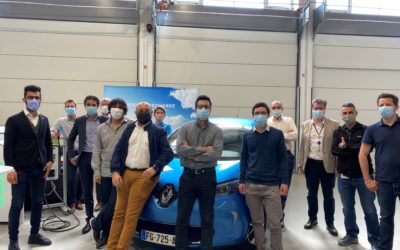Mobile Hyperplace Project. Autonomous and connectected vehicles : what are the impacts on our mobility and the way we live tomorrow ?
The emergence of the autonomous, connected electric vehicle, and the excitement it is generating, has been a very powerful catalyst for all of the innovation and developments already in progress in the mobilily sector. The Mobile Hyperplace project, conducted by the City on the Move Institute – VEDECOM (IVM – Institut pour la Ville en Mouvement) with the support of a multidisciplinary international hub, aims to identify, define, analyse and research the various current developments and practices in mobility activities, beyond the transportation of people or goods.
With the aim of presenting the initial results of this large scale project, IVM organised on February the 7th a day of meetings, gathering together more than 170 participants. The agenda includes : debate and discussion sessions, film projections, micro-workshops, presentations, etc.
Observe society in order to innovate
The project objective is to reveal the unexpected urban forms generated by new interactions between spaces, mobility solutions, connectivity solutions and activities. To this end, the IVM has observed the current practices, lifestyles and consumerism. With the support of its network of partners in Latin America, China, Africa and in Europe, the international research hub has identified no less than 250 mobility activities : from an African mobility scooter equipped with a Wi-Fi system to the experimental mobile abattoir in Sweden, not to forget the new types of cinema or mobile media libraries. Observing how vehicles for mobile activity already contribute to redefine everyday locations, IVM expects to predict possible splits caused by the generalisation of autonomous connected vehicles (ACV).
The mobility of tomorrow : activities, socialty and interaction
With the benefit of all observations made in various territories, the international research hub is launching the second project phase. The challenge is to test equipment in partnership with local stakeholders and territories and to conceptualise the urban situations, urban microspaces and mobile hyperplaces of the future. If it can be said that the new functionalities offered by smartphones have not only enhanced the telephone but have now overtaken the telephony function in terms of focus, then it is likely that with autonomous vehicles, the transportation function will be overtaken by a multitude of activities: work, sport, entertainment, etc. By freeing us from the obligation to drive, the autonomous connected vehicle is changing our relationship with time in travel (which will no longer be “lost”) and our relationship with space in these new vehicle types (the interior equipment of which requires rethinking).
“The autonomous connected vehicle, as we call it, could be the trigger for far-reaching change in the mobility sector. Mobile hyperplace is a collaborative project that tackles mobility issues beyond the simple transportation of people and goods”, explains Mireille Apel-Muller, Director of the City on the Move Institute. “One of the project objectives is to invent autonomous and connected vehicle applications when the focus is not primarily travel but on-board activity”, she adds.
According to Philippe Watteau, Managing Director at VEDECOM, in his closing address, “the obsession with movement, such is the new focus, the new opportunity and the new freedom provided by autonomous mobility. It is targeted, at a level beyond that of the technology, by the VEDECOM-IVM’s Mobile Hyperplace programme through the radical development of the issue of new applications of autonomous mobility.”
Mobile Hyperplace website : https://www.mobilehyperplaces.com/
Interviews on Youtube
Articles récents :
European 5G-MOBIX Project French site Demonstration and Seminar
5G for connected and automated cooperative mobility: towards greater safety and efficiency 21 April 2022, 9 AM - 6 PM Organisation : VEDECOM, Catapult, AKKA Technologies and VALEO Location: VEDECOM headquarters at mobiLab and Satory tracks, Versailles. 23 bis allée...
E-mobility: a successfull demonstration of the Certificate Trust List for Plug & Charge interoperability
The Certificate Trust List has been demonstrated on the 2nd of June 2021 as a technical solution for ISO 15118 Plug and Charge interoperability. The objective is to simplify the user experience wherever he is and guarantee the interoperability between any vehicle and...
“Machine Learning for the distributed and dynamic management of a fleet of autonomous taxis and shuttles”
Thesis defence of Tatiana BABICHEVA « Machine Learning for the distributed and dynamic management of a fleet of autonomous taxis and shuttles » 10 mars 2021 - 9h30 Online : Zoom Follow this event : [button...



